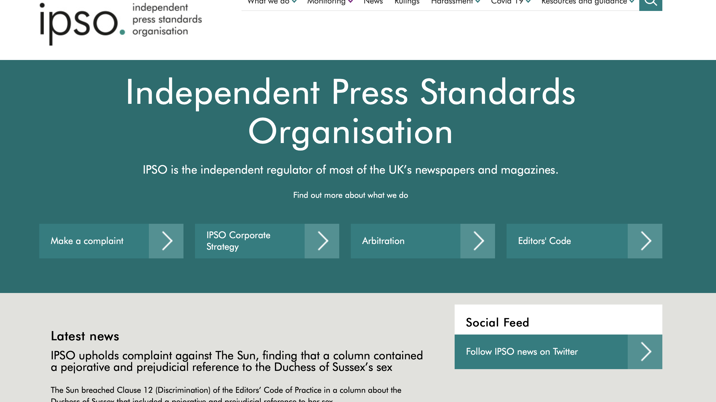
IPSO says the Guidance on Reporting of Sex and Gender Identity covers the reporting of court proceedings, the importance of accurate representation of policy, and whether information about an individual’s gender identity is genuinely relevant to the article.
Developing and publishing non-binding guidance is one way that IPSO supports editors and journalists to raise editorial standards and comply with the Editors’ Code of Practice - the framework IPSO uses to regulate the press.
IPSO determines which subjects to produce guidance on from its monitoring of editorial standards and the complaints it receives. IPSO first published guidance on researching and reporting stories involving transgender individuals in 2016.
Jane Debois, head of standards and regulation at IPSO, said: “We identified that reporting of sex and gender identity regularly features in the UK press.
“Engagement with journalists, advisory groups and IPSO committees revealed the plurality of opinions held and the challenges faced when reporting on sex and gender identity.
“This non-binding guidance is intended to support journalists and editors in the reporting of sex and gender identity, understand how the Editors’ Code of Practice is applied and to raise editorial standards in this area of reporting.”
IPSO says key points from the guidance include:
- The press should not make pejorative or prejudicial reference to an individual’s sex or gender identity.
- Journalists may use various methods to ensure coverage of sex and gender identity is accurate. This may include, but is not limited to, providing information, presenting different opinions where relevant, and approaching second sources.
- Journalists should consider whether information about an individual’s gender identity is genuinely relevant to an article. Examples of relevance could be where a quote needs to be contextualised or to explain the inclusion of a source.
- Language relating to gender and identity is nuanced. Journalists should take care not to publish inaccurate and misleading information.
- It is important that journalists can report on children and the issues they are facing. The Code says that children should be free to complete their time at school without unnecessary press intrusion. Consent is required from a child’s parent or legal guardian for the publication of interviews or photographs where the child’s welfare is involved.
A consultative approach
The guidance has been published following a four-week consultation which was open to anyone interested in this topic, added IPSO.
This consultative approach was adopted to take account of nuanced and widely held views across society, to hear from people with varying perspectives, and to make the guidance as inclusive as possible.
People from the LQBTQIA community, journalists, members of the public, academics, civil servants, and people who work within the charity sector submitted detailed responses to the consultation.
Some respondents considered the volume of press coverage disproportionate to the number of transgender individuals living in the UK and held the view that misgendering individuals happens frequently. They felt journalists and editors should use someone’s current name and pronouns when writing about that person, so they don’t misgender someone in their coverage. If unsure they should ask the individual how they would like to be identified.
Other respondents said sex and gender identity were two separate and distinct concepts. Their view being that birth sex is binary and immutable.
Jane Debois added: “We received a positive response to our public consultation on the draft guidance. The responses received highlighted the interest in this area of reporting and the differing opinions held by many.
“The purpose of the guidance is to highlight challenging areas that have been raised by editors and considered by IPSO’s Complaints Committee.
“The consultation results showed that there are areas to continue to consider carefully: the reporting of transgender defendants, and the presentation of opinions.
“The final guidance, which includes some of the suggestions from the consultation, is not meant to be prescriptive or oversimplify a complex area of reporting.”
You can read IPSO’s response to the consultation here.
You can read the full guidance here.
Keep up-to-date with publishing news: sign up here for InPubWeekly, our free weekly e-newsletter.











